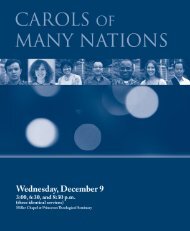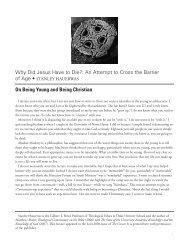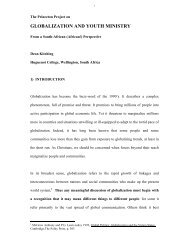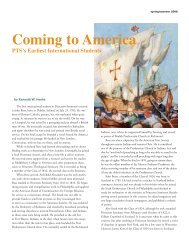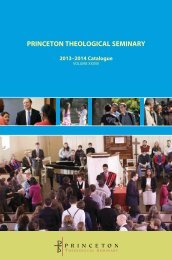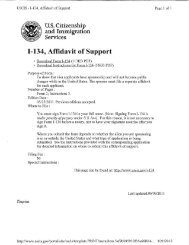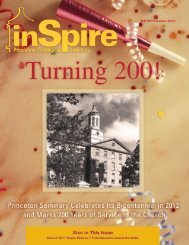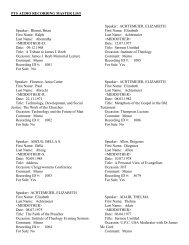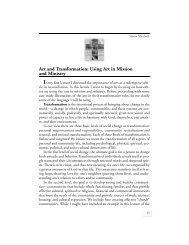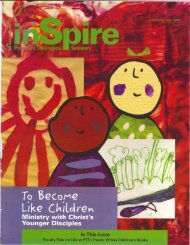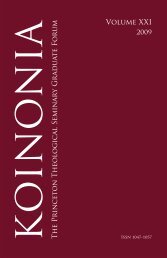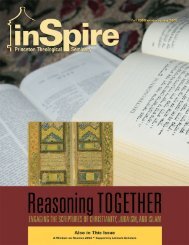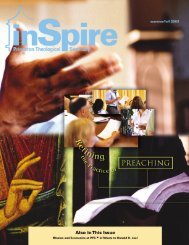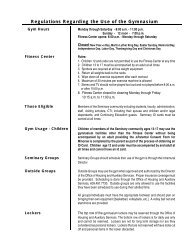Perspectivas/Occasional Papers • Fall 2006Perspectivas/Occasional Papers • Fall 2006Multiple-belonging: Diversity in the Divine ImageExploring identity in terms of an expanded understanding ofhybridity as multiple-belonging, recognizes that human diversityis experienced as a belonging that is necessarily located, situated,embodied, engendered and lived—culturally, linguistically,socially, economically, politically, racially, religiously, sexually,spiritually. This hybridity is grounded in a shared humanity andderived from creation in the divine image that imparts a foundationalcommonality that must dictate the minimum level of expectationin our ethical behavior towards each other on the micro andmacro levels.Our embodied particularity is experienced as multiple-belongingthrough a variety of biological, geographical and relationalfactors. What we seek is not sameness but points of intersectionthat allow us to engage. According to Hawaiian author DarrellLum, the impulse to establish relationality in his context is criticalto understanding local culture that is also poly-cultural. Forexample, in Hawaii, a typical conversation-starter is the question,asked in Hawaiian Creole English (pidgin) “What school youwent?” This question has “its root in the native Hawaiian way ofidentifying oneself by geography and genealogy.” 57 Lum continues,“rather than being a question that divides us, [it] is fundamentallyan effort to discover how we are connected.” 58 We do notneed to become each other in order to be companions or even kin;respect for diversity entails a search for intersections and connections.As such, this Hawaiian local ritual “is expressly a way fortwo people to begin discovering their relationships with eachother, however distant, in order to talk stories that sprout on commonground. It is a way to begin weaving their histories together—andthis defines friendship, or an aspect of it, local style.” 59This way of engaging across contexts by privileging the local in apoly-cultural environment, offers fruitful possibilities for furtherconversation with U.S. Hispanic theologians and our privileging100of lo cotidiano, the daily, and our understanding of relationshipsthrough compadrazgo. 60At the same time, a critical appropriation of multiple belongingrequires attention be paid to the experience of multiple not-fittingin. Whether by choice or accident, as the result of other’scruelties or own stances, this is also a reality that inclusion rhetoricglosses over. Explorations of our hybridity and multiplebelongingmust also include a sustained conversation regardingmultiple-not-fitting-in. In other words who gets left out in ourconstructions of identity and community? Who resides on ourmargins when we omit the stories of our intersections? Who isostracized on the basis of arbitrary criteria determining the norm?Who is privileged and who is excluded when a particular norm isassumed as common? Who is silenced? Who loses agency? Whoare the gatekeepers controlling access?As theologians arising from the heart of a people who constitutethe plurality of the U.S. Catholic Church and the largestminority population in the United States, we need to understandourselves in a new way—as a majority. Theologizing from thisperspective of majority, our past and contemporary experiences ofmarginalization have sensitized us to the dangers of privilegingcertain particularities and of inflating their significance with universalimport. La comunidad latina is not the church’s diversity;we are the church! Our contextual horizons charge us as theologiansto question and critique current operative paradigms ofdiversity that fail to recognize it as constitutive of our human,national and ecclesial conditions. Our contextual horizons inviteus as theologians to pursue new directions for further explorationof diversity as these have ethical, practical and pastoral implications.Creation in the divine image may actually say more about therichness of God’s diversity than our own humanity. In the wordsof Fray Juan de Torquemada 61 this diversity as reflected in the101
Perspectivas/Occasional Papers • Fall 2006Perspectivas/Occasional Papers • Fall 2006“marvelous variety of colors” was the intentional creation of God:There is no other reason for this [variation] than God’swish to display his marvels through the variety of colors.Like the colors of the flowers in a field, he wishedfor them to preserve that given to them by nature. Inthis way, just as God is praised in the many shades offlowers, so too is the Almighty blessed and praised inthe different and varied colors of [hu]mankind. It isthrough his artifices and paintings that he chose toshow the boundlessness of his wisdom. 62Torquemada’s theological reflection comprehends diversity asan expression of divine intention, not an accident, a problem oreven a challenge. Retrieving this insight from the depth andbreadth of our Hispanic theological heritage provides directionfor the development of new paradigms that address the nuevarealidad that is our U.S. Catholic Church. Human creation in thedivine image is creation in the divine diversity. Reflected in ourembodied, engendered and located differences are the splendor,the complexity and the very mystery of God.NOTES1 This article developed from two different papers delivered at the 2003 and 2005annual meetings of the Catholic <strong>Theological</strong> Society of America (CTSA). See GaryRiebe-Estrella, Hispanic/Latino/a Theology, “The Vocation of the Latino/aTheologian: Speaking for Whom? Speaking to Whom?” Proceedings of the Fifty-eighthAnnual Convention, The Catholic <strong>Theological</strong> Society of America, Volume 58 (2003),147-148; Gary Riebe-Estrella, Latino/a Theology, Proceedings of the Sixtieth AnnualConvention, The Catholic <strong>Theological</strong> Society of America, Volume 60 (2005), 142-143.2 Martín Espada, “Sheep Haiku,” in Alabanza: New and Selected Poems 1982-2002 (NewYork: W.W. Norton & Co., 2003), 210.3 Luis N. Rivera-Pagán, “A Prophetic Challenge to the Church: The Last Word ofBartolomé de las Casas.” Inaugural lecture as Henry Winters Luce Professor inEcumenics and Mission, delivered on April 9, 2003, at <strong>Princeton</strong> <strong>Theological</strong><strong>Seminary</strong>. http://www.lascasas.org/Rivera_Pagan.htm1024 Unless they appear as such in a cited quotation, words and expressions in Spanishare not italicized. This reflects the dynamic interaction between Spanish and Englishin the daily lived experience of U.S. Latinos/as. The terms “Hispanic” and“Latino/a” are used interchangeably, and the grammatically gendered endings(Latinos/as) are employed so as not to suggest false correspondences betweengrammatical and natural gender.5 I use the term realidad nueva not to imply that the Hispanic/Latino/a presence inthe United States and in the Catholic church is a recent one. Rather the expressionunderscores a reality that “despite their [Latinos/as] long-standing, constitutive rolein North American history, sheer demographic growth and diversification point to amarkedly new structural positioning and cultural dynamic for Latinos in the secondhalf of the twentieth century” and into the twenty-first. See Juan Flores, “The LatinoImaginary: Dimensions of Community and Identity,” in Tropicalizations: TransculturalRepresentations of Latinidad, Frances R. Aparicio and Susana Chávez-Silverman, eds.(Hanover, NJ: Dartmouth College, University Press of New England, 1997), 190.6 Orlando Espín, “An Exploration into a Theology of Grace and Sin,” in From the Heartof Our People: Latino/a Explorations in Catholic Systematic Theology, eds. Orlando Espínand Miguel Díaz (Maryknoll, NY: Orbis Books, 1996), 126.7 Ada María Isasi-Díaz, Mujerista Theology: A Theology for the Twenty-first Century(Maryknoll, NY: Orbis Books, 1996), 71.8 Many Latino/a theologians claim to do their theologies de conjunto or en conjunto.Therefore to do theology latinamente, as Orlando Espín observes, refers to a mannerof doing theology jointly whereby “the ‘product’ ultimately belongs to thecommunity…and must also spring from and reflect the reality and faith of thepeople among whom the theologians live and work.” See Orlando O. Espín andMiguel H. Díaz, eds., From the Heart of Our People: Latino/a Explorations In CatholicSystematic Theology (Maryknoll, NY: Orbis Books, 1999), 1-3, 262-263.9 Miguel Díaz, On Being Human: U.S. Hispanic and Rahnerian Perspectives (Maryknoll,NY: Orbis Books, 2001), 115.10 Department of Communications, United States Conference of Catholic Bishops(USCCB), “Catholic Information Project: The Catholic Church in America—MeetingReal Needs in Your Neighborhood.” (May 2005), 4.http://www.usccb.org/comm/2005CIPFinal.pdf11 USCCB, “Catholic Information Project,” 4.12 USCCB, “Catholic Information Project,” 5.13 Secretariat for Hispanic Affairs, United States Conference of Catholic Bishops(USCCB), “Hispanic Ministry at a Glance.” http://www.usccb.org/hispanicaffairs/demo.shtml#114 According to the USCCB, “2,900 of the nation’s 44,212 priests are Hispanic.” Seehttp://www.usccb.org/comm/cip.shtml#toc3103



